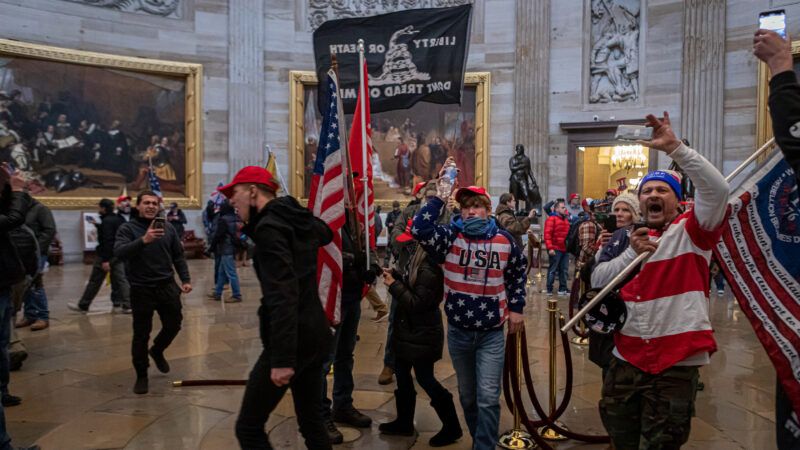Why Purging Social Media of Extremist Speech Might Not Make Us Safer
Law enforcement will have an easier time arresting and prosecuting criminals on Parler than on Telegram.

It's been a wild week on social media. Twitter and Facebook permanently suspended President Trump following the Capitol riots; Twitter removed 70,000 accounts for allegedly promoting violent and conspiratorial content; Facebook mistakenly locked former congressman Ron Paul out of his account, an incident that demonstrates the perils of overly broad moderation; Apple and Amazon moved to eliminate Parler from the former's app store and the latter's servers, effectively destroying the alternative platform used by many Trump supporters.
The social media companies' treatment of both Trump and Parler has prompted furious criticism from conservative pundits and politicians. "Big Tech wants to control what we see, how we behave, and what we say," said Rep. Matt Gaetz (R–Fla.) in a statement entirely characteristic of the right's response.
These moderation decisions can be defended on their own: Trump has repeatedly violated Twitter's terms of service, and spokespersons for the company have frequently suggested that he was receiving leniency only because of his status as president. The Capitol riots, in which Trump's inflammatory rhetoric likely played some role, are a new low for his presidency, and the platforms are understandably worried that future calls to reverse the outcome of the 2020 election could inspire further violence. Moreover, Twitter, Facebook, Amazon, and Apple are all private companies, and thus they have broad latitude to curtail speech, even in cases where doing so is not wise or well-founded.
It's also fair to criticize the platforms for decisions that appeared hypocritical. While Parler has certainly played host to extremist speech, so have Twitter and Facebook—but Apple and Amazon didn't punish either of them, which makes it seem like Big Tech is picking on a politically disfavored minor competitor. "It looks a lot like they're making Parler a sacrificial lamb to political pressure to do something about people talking too uncontrollably online," noted Reason Senior Editor Elizabeth Nolan Brown.
There's another reason to be wary of far-reaching bans and takedowns that have the effect of purging extremists from mainstream social media sites: Many such social media users will migrate to corners of the internet where it's harder to track their activities. Ironically, this could make it more difficult for law enforcement to foil violent plots, and more challenging to prosecute those who are responsible for violence.
Indeed, the swift justice currently being meted out to the rioters who stormed the Capitol last week is an illustration of this point. From the man who stole House Speaker Nancy Pelosi's (D–Calif.) lectern to the masked figure who brought zip ties (and his mom) inside the building, social media has been indispensable at helping to identify riot participants. The fact that so many of them tweeted about their plans—or even uploaded selfies while they were in the act of trespassing—means it will be trivially easy to arrest, try, and convict them.
There are similar lessons in counterterrorism. A recent study by the criminologist Joe Whittaker took a look at the Islamic State's social media presence and found that the group was too online for its own good. Terrorists who discussed their plans on social media were twice as likely to be apprehended by law enforcement.
"It is vital to understand the unintended consequences," wrote Whittaker. "This is particularly the case for content removal, which may inadvertently be aiding terrorists and hampering law enforcement investigations."
It's very clear that efforts to remove pro-ISIS content from Twitter and Facebook prompted the terrorist group to begrudgingly migrate to Telegram, an encrypted messaging service. Over time, ISIS became extremely reliant on the service, which made the group vulnerable; in November 2019, Telegram participated in a wildly successful police initiative to identify terrorists who were using the platform for recruitment. Even ISIS's use of this somewhat more underground social media site ended up backfiring.
Many people who were kicked off Twitter or Parler—or are perhaps fearful they could be next—are currently flocking to Telegram and Signal, another encrypted messaging service. If these platforms become the default organizing centers for the kinds of right-wing political extremists currently threatening to unleash more violence on Trump's behalf, they might be harder to foil in the future.
This doesn't mean social media platforms should abandon efforts to moderate extremist content entirely, just that we should be wary of the tradeoffs involved in such moderation. I have to imagine the FBI would prefer for terrorists to livestream their seditious plots, complete with location tracking and time stamps, on an easily accessed social media site.


Show Comments (114)